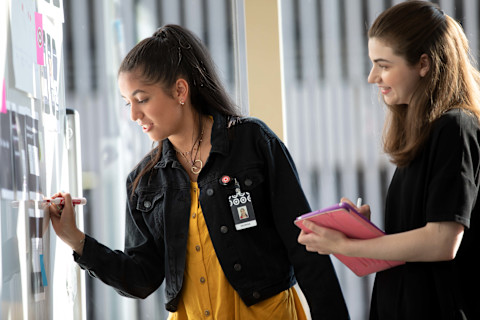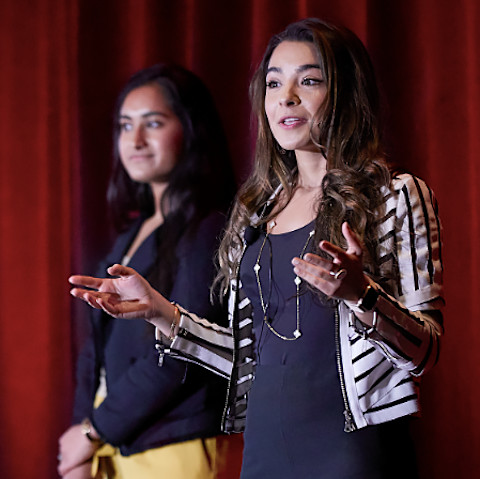These Next-Gen Entrepreneurs Are Writing The Blueprints For A Better World

Whether it's using technology for good, solving a sustainability problem, or empowering the next wave of workers as the modern workforce evolves, making the world a better place starts with an idea—and the entrepreneurs of the next generation are proving to be the geniuses behind them.
Below, meet three of the big thinkers and doers who are propelling some of our planet's most important movements. We heard about these intelligent young women first through Target Incubator, an accelerator program held at Target's Minneapolis HQ every year to help build and scale mission-minded businesses with the potential to spark powerful change in the world. (It's also why we're certain this won't be the last we hear of them). With one-on-one mentorship from business leaders and successful startup founders, Target Incubator program gives these young entrepreneurs the resources to take the next step in their entrepreneurial journey.
As a mentor for the Target Incubator cohort, Caroline Wanga—Target's chief culture and diversity and inclusion officer—put it this way: "When I think about this generation, I think about how well equipped, innovative, and action-focused they are. I fully trust them."
1. The future of social media: We need safer and more supportive spaces.
As high schoolers, Georgia Messinger and Ari Sokolov combined their Girls Who Code brainpower to create a whole new social network concept—with a much-needed focus on inclusivity.

"After sending out an anonymous social media poll to thousands of LGBTQ+ teens," they said, "we were stunned to see that many LGBTQ+ teens felt isolated and alone. [Social media] companies have failed to realize that our generation craves deeper connections beyond likes and follows."
In response, they started Trill (a combination of "true" and "real"), an anonymous social platform that offers moderated peer support for users who identify as LGBTQ+, struggle with mental health, are recovering from trauma, or are otherwise just looking for an alternative to traditional social networks. The whole idea is about helping a generation that's grown up in a plugged-in world actually feel a true and real sense of belonging in a safe space. And they're on to something: Trill has been downloaded over 50,000 times in more than 40 countries.
Their time at Target Incubator fueled their idea even further: "We heard from leaders in technology at Twitter and Target who are using artificial intelligence as a way to promote diversity and inclusion," the founders said. "This instilled in us a new appreciation for the ways in which big companies are addressing biases and inequities in the workplace and in the world."
2. The future of work: We need a more meaningful gig economy.
The emerging ecosystem of side hustling, freelancing, contracting, and so on is changing what the modern workforce looks like. In fact, a whopping 40% of the current U.S. workforce already participates in the gig economy, with predictions that by 2027, that percentage will grow to the majority of the U.S. workforce.

As with any large-scale transition, the shift won't be without growing pains, affecting everything from business operations to workers' rights. To help all parties involved thrive as this new model evolves, Nikita Gupta and Ahva Sadeghi created a software platform called Symba, a resource designed to help our current culture get on board with this new normal. In Nikita and Ahva's words, "Our ultimate mission is to equip the next generation of workers and employers with the necessary tools and infrastructure to succeed and develop symbiotic relationships."
Essentially, the duo and their all-female team are putting their heads together to design the future of work. After spending eight weeks with the Target Incubator cohort, they're more inspired than ever: "As social entrepreneurs, it's important to bounce ideas off of each other and have a shared sense of community throughout the startup journey. Target Incubator truly captured that essence and created an environment for founders like us to succeed." Check out Symba's new series, #NextGenWork, to see how they're spotlighting members of the gig economy to help this new model gain momentum.
3. The future of food waste: We need to remember there's a use for everything.
"I'm proud to be a waste warrior," says Kaitlin Mogentale. She's the founder and CEO of Pulp Pantry, a company that's grown from a food-waste-turned-healthy-snack startup to an organization fighting for a waste-free future everywhere.

"There is a growing awareness of the need for sustainability and a shift toward conscious consumption," Kaitlin said. "But, in a mainstream sense, we're not there yet."
The young entrepreneur has made it her mission to build awareness of the importance of sustainability through something we all have a personal connection with: our food. With mentorship from Target Incubator, Pulp Pantry is now bringing together farmers, chefs, food scientists, and more to help encourage curiosity and exploration in America's kitchens. "I think the key to success is a playful, curious approach. With an openness to explore and experiment, we can all be zero-waste chefs."
But the endgame is more than learning how to make your own veggie-scrap granola. "The statistics on the resources required to sustain the food industry are staggering. Our global food system demands 50% of the planet's habitable land, 70% of freshwater resources, and is responsible for nearly one-third of greenhouse gas emissions," said Kaitlin. "Over one billion people are employed by the food industry in some way! So yes, when we waste food, we also waste so many more resources than meets the eye." That's the bigger picture, and it's big ideas like Kaitlin's that might just help us get there.
Target Incubator is now accepting applications for the 2020 cohort! The deadline to apply is December 2, 2019, at 11:59 Central Standard Time. Apply now!
